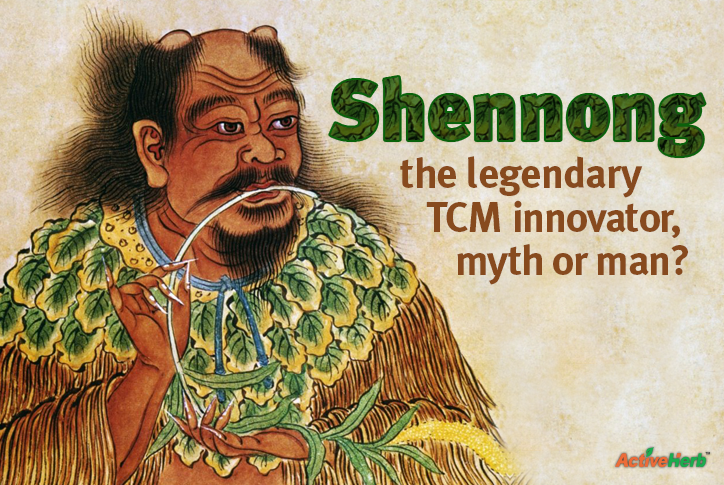Shennong: Was This Legendary Innovator Of Traditional Chinese Medicine Myth Or Man?

You might think that traditional Chinese medicine evolved over millennia, born out of holistic philosophies rooted in the interconnectedness between the natural world, the cosmos and mankind. And you’d be right.
Except that there is one person (more likely a mythical deity) credited with being the father—a godfather, if you will—of Traditional Chinese Medicine.
His name was Jiang Shinian. But in folklore, he is better known as Shennong.
Let’s get to know this mythical, innovative founder of TCM and farming in ancient China.
Who Was Shennong?
Was Shennong a mortal man or a folkloric deity?
Was Shennong really the inventor of agriculture and herbal medicine in ancient China?
Did Shennong single handedly introduce crop cultivation to China by inventing the plow, the hoe, the cart, irrigation systems, and the digging of wells? Should Shennong be credited for the advent of seed storage via the boiling of equine urine, as legend has it?
Does the origin of trendy weekly farmers markets really date to approximately 2500 B.C.E. when Shennong supposedly introduced the concept?
Did Shennong introduce a standardized form of measurement to a nascent agrarian China? And what of the Chinese calendar 24 yearly solar periods? Yup, Shennong did that—if you’re to believe the legend.
One more earth-shattering innovation, credited to Shennong: tea. The origin story goes that one day, Shennong had leaves burning above a fire when suddenly, a gust of air blew the leaves into a nearby cauldron of boiling water. After drinking the liquid, Shennong realized the therapeutic potential of herbal tea, including acting as an antidote to dozens of poisonous herbs.
Shennong and TCM
To keep the legend going, let’s talk about Shennong’s contributions to TCM. The Chinese ruler known as the first Yan Emperor, fine-tuned the diagnostic art of pulse diagnosis. He is also credited with perfecting acupuncture and moxibustion (a therapeutic practice still used today by TCM experts, who burn mugwort on specific areas of the body).
If you’re a big proponent of traditional Chinese herbs, pay homage to Shennong. Legend has it that he tasted hundreds of herbs, categorizing them according to their properties (sweet, bitter, etc.) and which channels (organ systems) the herbs influenced.
Shennong classified herbs that were not harmful (poisonous) and acted as a rejuvenating tonic as “superior”. Herbs that elicited a tonic effect yet could be toxic to the user if taken at high dosage were considered by Shennong as “medium”. Finally, the third class of herbs elicited a quick action but had the potential to be highly poisonous. These herbs Shennong classified as “inferior.”
After volunteering to be ancient China’s first laboratory guinea pig, Shennong put together a list of 365 medicines, mostly plants (also some minerals and animal parts). This compendium was passed through the generations and 2,000 years later, 200 years after Christ, was recorded in a book known as the Shennong Bencao Jing (Shennong’s Materia Medica).The Materia Medica—a first volume of sorts of the Chinese Pharmacopeia—remains a highly influential reference book for TCM practitioners to this day.
Shennong’s Superpower: Transparency
Now here’s where things really get interesting… According to the legend, Shennong’s body was transparent. What better way to observe the effects of herbs!
Eventually, Shennong’s willingness to self-experiment led to the ultimate sacrifice. Although largely considered a mythical legend, he didn’t live forever. The story goes that he succumbed to the toxic effects of a seed in a particular weed that ruptured his intestines. Shennong was unable to reach one of the healing teas he invented in time to recuperate.
When And Where Did Shennong Live?
Shennong is also known as the Divine Farmer or the Yellow Emperor. He is thought to have lived from circa 2737 to 2697 BCE. This would lend some realistic credence to the belief that TCM originated approximately 5,000 years ago.
However, there is little information on the use of herbal medicine prior to The Shennong Herbal, a manual that covers the use of medicinal herbs, which only dates back about 1,800 years ago.
Shennong, according to tradition, ruled China during the Three Sovereigns and Five Emperors period. He, himself, was one of the three elite sovereigns who ruled prehistoric China.
As for Shennong’s home turf, it depends on whether or not he was a real person or a mythical deity. According to Ancient Origins, the mythical Shennong was born to a princess and a divine dragon slightly northeast of the ancient Chinese capital Xian, which lies in the Hua Shan mountains. Or, his mythical birthplace may have been in modern-day Fufeng county, where ancient metal works were discovered, proving an ancient civilization thrived there.
But let’s suspend our element of disbelief. If Shennong was indeed an actual historical figure, an ancient George Washington of China, scholars believe his birthplace was either near the eastern border of Shaanxi Province or near Lishan mountain in Hubei Province, site of a tributary of the Yangtze River called the Shennong stream. Lishan mountain is also home to Shennong Cave, believed to be the ancient ruler’s burial place.
Shennong: Man, Myth & Legend
Shennong remains a beloved figure in modern China, regardless whether one views him as a mystical entity or a benevolent corporeal ruler.
As to whether or not Shennong really invented traditional Chinese medicine, farming techniques, the calendar, etc., well, that depends upon you, dear reader.
What is known is that the teachings of Shennong continue to serve as inspiration to Chinese people. To be clear, credit for the development of TCM does not and should not go to Shennong alone. Whether or not Shennong was a real person or a mythical legend, we can thank this God-like father (a true Godfather) for taking one for the team of humankind and self-experimenting on all of those herbs!




